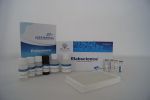ELISA
ELISA
Enzyme-linked immunosorbent assay (ELISA) is an established laboratory technique to detect and quantify a target molecule within a sample. The basic ELISA principle involves the use of an enzyme-conjugated antibody to detect an antigen which has been immobilized to a solid matrix, typically the wells of a microtiter plate.
What are the different types of ELISA?
Several types of ELISA have been developed since the technique was first described. In a direct ELISA, the antigen is adsorbed to the microtiter plate and is detected using an enzyme-conjugated primary antibody. The indirect ELISA technique requires an additional protocol step since an enzyme-conjugated secondary antibody is used for detection. During a sandwich ELISA, the antigen is captured between two antigen-specific antibodies, one of which is enzyme-conjugated and the other adsorbed to the microtiter plate. In each method, the amount of antigen present in the sample is usually determined by enzyme-mediated catalysis of a colorimetric substrate.
Ready-to-use commercial kits
Variations of all three basic ELISA methods have been developed to increase assay sensitivity and throughput, and a wide range of ready-to-use ELISA kits is commercially available. Containing all the necessary components to detect and measure a specific analyte, pre-configured ELISA kits deliver considerable time savings by reducing the need for in-house assay development and optimization.
American Research Products supplies an extensive range of ELISA kits that are designed to quantitatively measure specific antigens with a high degree of sensitivity.







